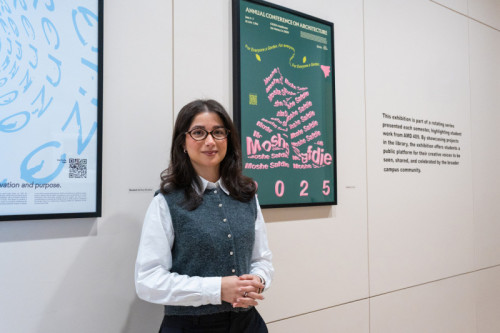 New Gallery Showcases Student Art in LibraryThe event that inspired the class project was imaginary. But for Sonia Ellis and fellow Cal State San Marcos art students, the payoff was very real. Last year, Ellis was a student in AMD 409: Advanced Graphic Design and Visual Arts, an upper-division class taught by Ghazal Foroutan. The assignment: Using only typography, create a promotional poster for a hypothetical California architecture conference being hosted by CSUSM. The twist: Some of the posters that resulted would be displayed as part of a new student art gallery in Kellogg Library. Ellis made a poster about acclaimed Israeli-Canadian-American architect Moshe Safdie, and hers was one of 19 selected for the exhibit. “I was thrilled and honored to have my work chosen to be displayed in the library and kept in the archive,” said Ellis, an art, media and design major who’s scheduled to graduate this spring. “It gave a greater sense of purpose to the project.” The 19 posters compose the first installment of the Cougar Gallery, which is located on the library’s second floor, occupying the wall space between the Makery’s entrance and the stairwell down the hall. Foroutan said the idea came from a conversation with fellow art, media and design professor Kristin Moss, and it was brought to fruition through a collaboration with multiple employees of the library: associate dean Char Booth, outreach librarian Irma Ramos Arreaga, arts and humanities librarian Torie Quiñonez, and administrative coordinator Arely Ayala. The initial exhibit has adorned the library’s walls since the start of the fall semester. “Seeing the students’ work displayed in a prominent campus space has been incredibly meaningful,” Foroutan said. “As a professor, I am proud to share their work with the broader campus community and to see it recognized by the department and the library. “For students, the exhibition validates their efforts beyond the classroom. Many have already photographed their posters and plan to list the show as a group exhibition on their CVs, as well as include the work in their portfolios.” The Cougar Gallery, Booth said, fulfills a longstanding desire to increase the presence and visibility of student art in the library. As a prominent display of creative student work, it joins the Data Stacks on the library’s fourth floor. "By establishing this new gallery, we are showcasing the creative talents of CSUSM student artists and designers and dedicating a highly visible area of the library to School of Arts students and faculty as a much-needed supplementary gallery space,” Booth said. Once she was assigned Safdie as her subject (other famous architects featured include Frank Lloyd Wright and Frank Gehry), Ellis set out to make a poster that would promote a hypothetical discussion with the architect at the conference while also channeling the style and philosophy of that architect. In researching Safdie’s life and work, Ellis was drawn to his design theory, “For Everyone a Garden.” “He envisions architecture as a living, evolving environment, integrating gardens and green space into almost all of his designs,” she said. “That phrase became my guiding concept and tagline for the poster, inspiring my color palette and imagery.” Ellis incorporated both physical art and digital design in the creation of her poster. She also designed an accompanying booklet in the same style as the poster to round out the promotional material. “Over the weeks of working on the project, we all watched each other's concepts evolve in the studio, so seeing them printed professionally and displayed in a space where so many students pass through was very meaningful,” said Ellis, who plans to apply for the CSUSM teaching credential program, with a goal of becoming an art educator. Foroutan hopes to work with the library to rotate the exhibition at least once a year to showcase as many as much student artwork as possible. “While the overall framework of the project will remain consistent, I plan to subtly revise the assignment each year to introduce new constraints, tones or conceptual directions, allowing the exhibition to evolve over time,” she said. Media Contact Brian Hiro, Communications Specialist bhiro@csusm.edu | Office: 760-750-7306
New Gallery Showcases Student Art in LibraryThe event that inspired the class project was imaginary. But for Sonia Ellis and fellow Cal State San Marcos art students, the payoff was very real. Last year, Ellis was a student in AMD 409: Advanced Graphic Design and Visual Arts, an upper-division class taught by Ghazal Foroutan. The assignment: Using only typography, create a promotional poster for a hypothetical California architecture conference being hosted by CSUSM. The twist: Some of the posters that resulted would be displayed as part of a new student art gallery in Kellogg Library. Ellis made a poster about acclaimed Israeli-Canadian-American architect Moshe Safdie, and hers was one of 19 selected for the exhibit. “I was thrilled and honored to have my work chosen to be displayed in the library and kept in the archive,” said Ellis, an art, media and design major who’s scheduled to graduate this spring. “It gave a greater sense of purpose to the project.” The 19 posters compose the first installment of the Cougar Gallery, which is located on the library’s second floor, occupying the wall space between the Makery’s entrance and the stairwell down the hall. Foroutan said the idea came from a conversation with fellow art, media and design professor Kristin Moss, and it was brought to fruition through a collaboration with multiple employees of the library: associate dean Char Booth, outreach librarian Irma Ramos Arreaga, arts and humanities librarian Torie Quiñonez, and administrative coordinator Arely Ayala. The initial exhibit has adorned the library’s walls since the start of the fall semester. “Seeing the students’ work displayed in a prominent campus space has been incredibly meaningful,” Foroutan said. “As a professor, I am proud to share their work with the broader campus community and to see it recognized by the department and the library. “For students, the exhibition validates their efforts beyond the classroom. Many have already photographed their posters and plan to list the show as a group exhibition on their CVs, as well as include the work in their portfolios.” The Cougar Gallery, Booth said, fulfills a longstanding desire to increase the presence and visibility of student art in the library. As a prominent display of creative student work, it joins the Data Stacks on the library’s fourth floor. "By establishing this new gallery, we are showcasing the creative talents of CSUSM student artists and designers and dedicating a highly visible area of the library to School of Arts students and faculty as a much-needed supplementary gallery space,” Booth said. Once she was assigned Safdie as her subject (other famous architects featured include Frank Lloyd Wright and Frank Gehry), Ellis set out to make a poster that would promote a hypothetical discussion with the architect at the conference while also channeling the style and philosophy of that architect. In researching Safdie’s life and work, Ellis was drawn to his design theory, “For Everyone a Garden.” “He envisions architecture as a living, evolving environment, integrating gardens and green space into almost all of his designs,” she said. “That phrase became my guiding concept and tagline for the poster, inspiring my color palette and imagery.” Ellis incorporated both physical art and digital design in the creation of her poster. She also designed an accompanying booklet in the same style as the poster to round out the promotional material. “Over the weeks of working on the project, we all watched each other's concepts evolve in the studio, so seeing them printed professionally and displayed in a space where so many students pass through was very meaningful,” said Ellis, who plans to apply for the CSUSM teaching credential program, with a goal of becoming an art educator. Foroutan hopes to work with the library to rotate the exhibition at least once a year to showcase as many as much student artwork as possible. “While the overall framework of the project will remain consistent, I plan to subtly revise the assignment each year to introduce new constraints, tones or conceptual directions, allowing the exhibition to evolve over time,” she said. Media Contact Brian Hiro, Communications Specialist bhiro@csusm.edu | Office: 760-750-7306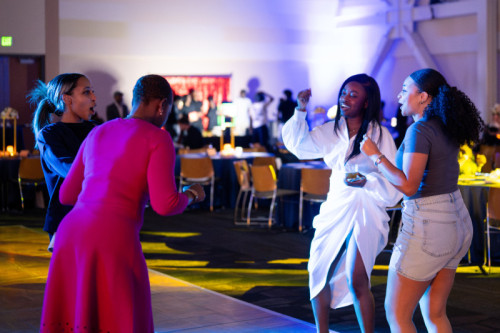 Black Student Center to Host Monthlong Black Excellence CelebrationAs Cal State San Marcos commemorates Black Excellence Month, the Black Student Center will host a series of events to celebrate the brilliance and resilience across CSUSM through arts, education, student engagement and community fellowship. The monthlong celebration will conclude with the annual Black Excellence Gala on Feb. 27. Black Excellence Month Kickoff Feb. 2, 11:30 a.m.-2 p.m., USU 2310 The Black Student Center (BSC) will kick off the celebrations with a brief presentation discussing the history of the Pan-African flag, a raising of the flag and a live drumline performance. Food will be provided at the event, which is open to all students. Def Jam Open Mic Night Feb. 5, 5-7 p.m., USU Amphitheater The BSC, in collaboration with the Cross-Cultural Center, invites students to enjoy a night of poetry, spoken word and music. The event is open to all students. Professional Styling: How to Tie a Tie Feb. 9, 1-2 p.m., USU 4200 As part of the “My Brother’s Keeper” initiative, the BSC will host a session of professional styling to teach students how to tie a tie. The event is open to all students. Sista Fest Feb. 10, 5-7 p.m., USU 2310 In collaboration with the Women and Gender Equity Center, the BSC will host an event to celebrate Black women on campus. This year’s theme, “Rooted and Radiant,” is focused on providing mentorship to young Black women looking to navigate professional spaces. The keynote speaker is Wendy Stewart, MiraCosta College’s chief diversity officer. The event is open to all students. Black Jeopardy Game Night Feb. 13, 5-7 p.m., USU Ballroom Students are welcome to join the BSC for a night of culturally relevant games. Food will be provided on a first-come, first-served basis. Carnaval Feb. 18, 5-8 p.m., USU Ballroom Join the BSU and the Latinx Center for a celebration of dance and heritage from various communities across Latin America and the African diaspora. The event will feature live music, cultural foods and mask painting inspired by Rio de Janeiro’s Carnaval and New Orleans’ Mardi Gras festival. Ebony Fashion Show Feb. 20, 5-8 p.m., USU Ballroom The inaugural Ebony Fashion Show will provide a space for students to showcase their elegance on the runway. The event will highlight the creative expression of students across CSUSM student centers to showcase cultural displays through fashion. Black Org Fair Feb. 25, 5-7 p.m., Forum Plaza All students are invited to learn about the various Black student organizations at CSUSM. Representatives will be featured from various academic, social, faith-based and national Panhellenic Council organizations. 2/27 Black Excellence Gala Feb. 27, 5:30-8:30 p.m., USU Ballroom As the finale of Black Excellence Month, the BSC will host an inaugural event in collaboration with Tukwut Life to celebrate and highlight the Black community. The evening will showcase achievements and inspiring stories from the community, followed by a student performance and live DJ. Guests are encouraged to dress in their finest attire to honor the occasion and the remarkable accomplishments being celebrated. Media Contact Eric Breier, Interim Assistant Director of Editorial and External Affairs ebreier@csusm.edu | Office: 760-750-7314
Black Student Center to Host Monthlong Black Excellence CelebrationAs Cal State San Marcos commemorates Black Excellence Month, the Black Student Center will host a series of events to celebrate the brilliance and resilience across CSUSM through arts, education, student engagement and community fellowship. The monthlong celebration will conclude with the annual Black Excellence Gala on Feb. 27. Black Excellence Month Kickoff Feb. 2, 11:30 a.m.-2 p.m., USU 2310 The Black Student Center (BSC) will kick off the celebrations with a brief presentation discussing the history of the Pan-African flag, a raising of the flag and a live drumline performance. Food will be provided at the event, which is open to all students. Def Jam Open Mic Night Feb. 5, 5-7 p.m., USU Amphitheater The BSC, in collaboration with the Cross-Cultural Center, invites students to enjoy a night of poetry, spoken word and music. The event is open to all students. Professional Styling: How to Tie a Tie Feb. 9, 1-2 p.m., USU 4200 As part of the “My Brother’s Keeper” initiative, the BSC will host a session of professional styling to teach students how to tie a tie. The event is open to all students. Sista Fest Feb. 10, 5-7 p.m., USU 2310 In collaboration with the Women and Gender Equity Center, the BSC will host an event to celebrate Black women on campus. This year’s theme, “Rooted and Radiant,” is focused on providing mentorship to young Black women looking to navigate professional spaces. The keynote speaker is Wendy Stewart, MiraCosta College’s chief diversity officer. The event is open to all students. Black Jeopardy Game Night Feb. 13, 5-7 p.m., USU Ballroom Students are welcome to join the BSC for a night of culturally relevant games. Food will be provided on a first-come, first-served basis. Carnaval Feb. 18, 5-8 p.m., USU Ballroom Join the BSU and the Latinx Center for a celebration of dance and heritage from various communities across Latin America and the African diaspora. The event will feature live music, cultural foods and mask painting inspired by Rio de Janeiro’s Carnaval and New Orleans’ Mardi Gras festival. Ebony Fashion Show Feb. 20, 5-8 p.m., USU Ballroom The inaugural Ebony Fashion Show will provide a space for students to showcase their elegance on the runway. The event will highlight the creative expression of students across CSUSM student centers to showcase cultural displays through fashion. Black Org Fair Feb. 25, 5-7 p.m., Forum Plaza All students are invited to learn about the various Black student organizations at CSUSM. Representatives will be featured from various academic, social, faith-based and national Panhellenic Council organizations. 2/27 Black Excellence Gala Feb. 27, 5:30-8:30 p.m., USU Ballroom As the finale of Black Excellence Month, the BSC will host an inaugural event in collaboration with Tukwut Life to celebrate and highlight the Black community. The evening will showcase achievements and inspiring stories from the community, followed by a student performance and live DJ. Guests are encouraged to dress in their finest attire to honor the occasion and the remarkable accomplishments being celebrated. Media Contact Eric Breier, Interim Assistant Director of Editorial and External Affairs ebreier@csusm.edu | Office: 760-750-7314
- Arts & Lectures Brings Music, Dance and History to CSUSMThe Arts & Lectures series returns to Cal State San Marcos this spring with concerts, performances and talks aimed at sharing music, dance, science and history. Events will take place across campus from January through April. All events are free for CSUSM students. Ching-Ming and Friends Chamber Concert Jan. 27, noon-1 p.m., Arts 111 Joined by CSUSM music professor Ching-Ming Cheng, the 11th annual Villa-Lobos International Chamber Music Festival will take place on campus to bring music composed entirely by Latin American composers. The program aims to celebrate Latin American chamber music across Southern California. CSUSM students: Free Faculty/staff/alumni: $5 Community: $10 Sponsored by the Funes Fund Gila Goldstein Piano March 10, noon-1 p.m., Arts 111 Internationally acclaimed pianist Gila Goldstein will perform a lunch-time recital on campus. The performance will include works by Vivaldi, Bach, Mendelssohn, Guastavino, Villa-Lobos, Lecuona, Ronn Yedidia and Gershwin. Before the event, there will be a piano master class on March 9 at noon in Academic Hall 104. CSUSM students: Free Faculty/staff/alumni: $5 Community: $10 Sponsored by the Funes Fund Stories From Home March 13, 6:30-8 p.m., Arts 111 “Stories From Home” is a series of dances embodying the oral traditions of Nuevomexicano, Chicano and Mexican American communities in the American Southwest. Choreographer Yvonne Montoya and a diverse cast of dancers draw upon personal histories as well as ancestral knowledge. The performance is a vessel for personal and specific tales, while also offering a broader look at various cultural traditions throughout the Southwest. An artist meet-and-greet will take place March 10 from noon to 1:30 p.m. at the Cross-Cultural Center. CSUSM students: Free Faculty/staff/alumni: $5 Community: $10 A Marriage of Art and Science: Entwined Research in a Nuclear Family March 23, 10:30 a.m.-1:30 p.m., USU Ballroom Art and science intersect with elin O’Hara slavick’s art, which maps radioactive residuum, and David Richardson’s epidemiological studies of radiation’s human impact. Slavick, who wrote “Bomb After Bomb: A Violent Cartography and After Hiroshima,” is an internationally exhibiting artist who captures the lingering effects of radiation with audiographs and creates contact prints of tree rubbings and architecture exposed to atomic bombings of Hiroshima, Nagasaki and Fukushima. Richardson, an epidemiologist who’s conducted studies of cancer among U.S. federal nuclear workers and Japanese survivors of the atomic bombings of Hiroshima and Nagasaki, is the lead writer on the United Nations Committee of Epidemiological Studies of Radiation and Cancer (UNSCEAR). CSUSM students: Free Faculty/staff/alumni: $5 Community: $10 Co-sponsors: Center ARTES STEAM ambassadors Peter Sprague Group Featuring Allison Adams Tucker March 24, 7-8:30 p.m., Arts 111 Masterclass 2:30-3:45 p.m. in Arts 111, open to the public Guitarist Peter Sprague loves jazz, but he also dips deep into musical history and unearths some sonic gems from the Beatles, Jimmy Webb and Antonio Carlos Jobim. For this concert, he connects with vocalist Allison Adams Tucker, pianist Danny Green, drummer Duncan Moore and bassist Mack Leighton for an evening of good sounds, good vibes and good times. The group recently released three albums: “All You Need Is Love” (Beatles), “Christmas Time Is Here” and “Peter Sprague Plays Jobim.” CSUSM students: Free Faculty/staff/alumni: $5 Community: $10 Veterans History Project II: The Journey Continues April 8, 5-8 p.m., USU Ballroom This event, which showcases recorded oral histories of military veterans, offers an intimate look into the personal experiences, challenges and triumphs of veterans from diverse backgrounds. Stories shared will be archived at CSUSM’s Kellogg Library and the U.S. Library of Congress, preserving their legacies for future generations. The keynote speaker will be Jim Gruny, a retired colonel in the Marine Corps. The formal program begins at 6 p.m., preceded by a reception and veteran resources and career fair. CSUM students/military-affiliated guests: Free Faculty/staff/alumni: $5 Community: $10 For more information, including ticket information, visit the Arts & Lectures series website. Media Contact Eric Breier, Interim Assistant Director of Editorial and External Affairs ebreier@csusm.edu | Office: 760-750-7314
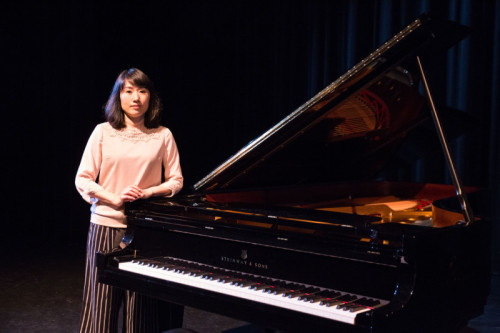
- Internships Help Shape Student’s Future in Public PolicyIlleana Carmona Chavez arrived at Cal State San Marcos certain she was headed for law school. But after she graduates with her bachelor’s in criminology and justice studies this spring, she will embark on a far different course, one that has taken her from student government to the governor’s office. The change in focus was shaped by her deep involvement in Associated Students, Inc., where she serves as the chair and chief of staff of CSUSM’s student government. Through ASI, Chavez joined Lobby Corps, an advocacy-focused volunteer group, and later traveled to Sacramento for the California Higher Education Student Summit, where she met with state legislators alongside students from across the CSU system. But the final realization of where her career was headed came from an internship opportunity. It was through ASI that Chavez met Zach Bunshaft, CSUSM’s director of government relations at the time. “Interning with Zach and seeing how higher education policies at the state level affected our campus was so impactful,” Chavez said. “These opportunities, being part of ASI and interning with Zach, changed the trajectory of my life and what I want to do.” CSUSM’s emphasis on internships proved transformational for Chavez. It not only prepared her for the professional world, it helped her discover the type of work that she’s truly passionate about. During her time as a government relations intern last spring, Chavez researched legislative officials to strengthen CSUSM’s advocacy efforts, engaged with policymakers at key events and explored ways to enhance student support across the region. As the internship was nearing its end, Bunshaft met with Chavez to review the experience. When Bunshaft asked about Chavez’s future goals, she told him how much she enjoyed the internship and how the experiences she had were the types of spaces she wanted to be in. The timing was perfect. Bunshaft had just learned about another internship opportunity with Gov. Gavin Newsom’s office. Bunshaft mentored Chavez throughout the hiring process, and she was hired as an external affairs intern for Newsom’s San Diego regional office. Her responsibilities included everything from supporting outreach efforts to drafting briefs and assisting with newsletters. “Illeana is a thoughtful, driven and reliable leader with an incredibly bright future,” said Bunshaft, who left CSUSM in December to become Newsom’s Southern California regional director of external affairs. “She has the innate ability to see the big picture and work together with others to inspire and achieve common goals. “I’ve had the pleasure of watching her confidence and skills grow with each new opportunity she enthusiastically embraces. I’m excited to see all that she will continue to accomplish in her academics, career and public service journey.” Chavez completed the internship with Newsom’s office in December. As she begins her final semester at CSUSM, she’s already looking ahead to the fall. She’s in the process of applying for graduate school to pursue a master’s in public policy or public administration (Cal State Fullerton, Sacramento State and San Diego State are her top choices). She’ll take the lessons she learned in her internships with her to grad school and beyond. She knows the internship process can be intimidating for students, but she has seen firsthand how it pays off. “The connections that we make in these internships, you never know where they're going to lead you,” she said. “I never imagined that doing an unpaid internship with Zach was going to lead me to the governor's office. “Whether it's paid or unpaid, there are so many opportunities. No matter what, even if it seems like you are the most unqualified person in the room to do that job, just go for it. You never know what can come of that opportunity.” Media Contact Eric Breier, Interim Assistant Director of Editorial and External Affairs ebreier@csusm.edu | Office: 760-750-7314
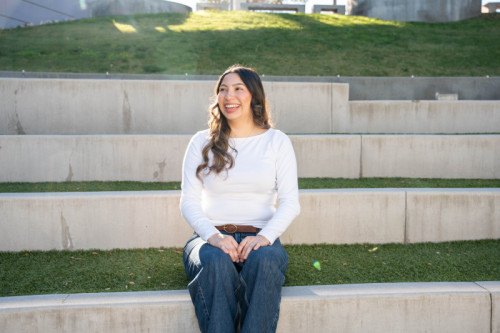
- Looking Back on Successes of 2025As the end of the year approaches, many are already looking ahead to 2026. But before putting the finishing touches on your list of New Year’s resolutions, let’s take a look back at some of the most-talked-about stories of 2025. Hunter Industries Gives Transformational $10M Donation for ISE Building In September, CSUSM announced a transformational $10 million philanthropic investment from Hunter Industries, one of the largest gifts in university history. The donation is supporting the construction of CSUSM’s new Hunter Hall of Science and Engineering, a cornerstone of the university’s commitment to preparing the next generation of engineers and scientists. Perfect Chemistry: Campus Wedding 16 Years in the Making If getting married at one’s place of employment seems unconventional, it shouldn’t to those who know biology professor Elinne Becket and chemistry professor Robert Iafe. The passion they have for their students is the same passion they have for the university, so it makes sense that the tied the knot on campus at the McMahan House on campus. CSUSM Kicks Off Historic $200 Million Fundraising Campaign Through the largest fundraising campaign in university history, CSUSM is aiming to raise $200 million to support student success and power the region’s future. The university officially launched its “Blueprint for the Future” campaign on Sept. 19. It’s an effort that combines philanthropy with grants and research funding. The campaign’s theme reflects both the physical growth on campus and the forward momentum building at CSUSM. Professor Elevates Samoan Language, Culture as Consultant for "Moana 2" Professor Grant Muāgututiʻa never could have dreamed that linguistics would take him to the shores of Oʻahu as he rubbed elbows with Dwayne “The Rock” Johnson and other stars of the Disney glitterati before the world premiere of the animated film “Moana 2” in 2024. Indeed, Muāgututiʻa was more than a little caught off guard when the filmmaking team behind the sequel to the wildly popular movie “Moana” from 2016 contacted him out of the blue two years ago. Construction of New Wellness and Rec Center Underway CSUSM held a Construction Kickoff on Nov. 12 to celebrate construction being underway for the Student Wellness and Recreation Center (SWRC), which is expected to open by summer 2027. CSUSM is partnering with Sea Breeze Properties – developers of North City, which includes CSUSM’s North Commons, The QUAD and the Extended Learning Building – on the SWRC, which will be the latest addition to campus life. Faith, Resilience Help Athlete Through Life-Threatening Crisis It all started with a headache. A seemingly normal ailment, but Malachi Wright doesn’t get headaches. And he definitely doesn’t get headaches that force him to leave work early or have him confined to the couch and throwing up for three straight days. That's when his mom, Ivonne Mancilla, knew this was something more. Wright spent the next 40 days in the hospital, undergoing three brain surgeries with no idea what the future would bring. But Wright defied all odds. Alumna Finds Purpose in Advocacy for Native Children and Families As Maya Goodblanket reflects on her time as a student, she vividly remembers the day she found the California Indian Culture and Sovereignty Center at Cal State San Marcos. Little did she know that she was meeting mentors that day who would help her achieve the career she has today. Goodblanket, a member of the Cheyenne and Arapaho Tribes of Oklahoma, serves as an Indian Child Welfare Act court advocate for the Valley Center-based Indian Health Council, which provides health and wellness services for American Indian communities in north San Diego County. Ask the Expert: A Scientific Perspective on the L.A. Fires When the hills above Los Angeles exploded in flames early last month, Matt Rahn snapped into action. Rahn, though, isn’t a firefighter who was called into duty to help battle what became one of the biggest and most destructive fires in California history. Rather, he’s a wildfire researcher at Cal State San Marcos who, in 2019, created a unique degree program called Wildfire Science and the Urban Interface. He’s also the executive director of the Wildfire Conservancy, a nonprofit research foundation dedicated to serving the state’s firefighters and protecting its communities. Cougar Care Network Marks 10 Years as a Campus Hub for Connection Built on listening first and guiding without judgment, the Cougar Care Network enters its second decade as a trusted stop for students seeking practical help, community and a path forward. The Cougar Care Network (CCN) launched in fall 2015 as part of Cal State San Marcos’ Early Support Initiative within the Student Outreach and Referral (SOAR) program. Chronic Illness a Journey of Strength, Self-Discovery ... and Salt The first time Emmi van Zoest rode in an ambulance was in May 2024. She was in the middle of her 10:30 a.m. Communication 200 class when she realized her vision and hearing were failing. She couldn't keep her legs or arms straight and she couldn’t speak. The full memory is hazy, but she found herself sitting outside of Crash’s Market in the University Student Union with a handful of salt packets and on a Facetime call with her parents, who live in Tennessee. This experience didn’t come out of nowhere. She has postural orthostatic tachycardia syndrome, or POTS, a chronic condition that she has lived with since her junior year of high school. Media Contact Eric Breier, Interim Assistant Director of Editorial and External Affairs ebreier@csusm.edu | Office: 760-750-7314
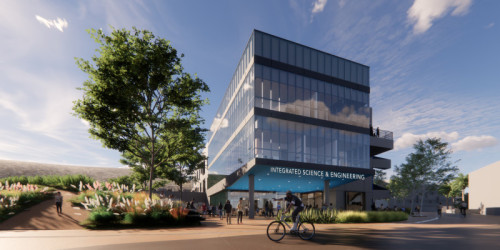
- Labor of Love: New Mom Graduating EarlyThis week, Cameron Aquino will finish her seventh and final semester at Cal State San Marcos, having graduated a semester early with a Bachelor of Arts in psychological science. Barring a disastrous outcome of her finals, she will finish as a member of the College of Humanities, Arts, Behavioral and Social Sciences dean's list in six of her seven semesters. And the one semester she didn’t earn it – fall 2024 – she was a bit preoccupied by having a baby. “And I was really close,” she said of her near-perfect dean’s list record. Aquino will walk in fall commencement at Frontwave Arena in Oceanside during the CHABSS ceremony next week, knowing that she accomplished her goals while allowing nothing to get in the way of her path. And her life journey has been winding. Born in Guam, Aquino has lived in Kentucky, Germany and California. She resided in Germany with her parents after her high school graduation before returning to the U.S. and beginning her undergraduate studies. She maintained the life of a normal college student, working and earning exceptional grades while living with her boyfriend and his family. Then came the surprise. While some students will naturally take a break – her mom was a college student when she got pregnant with her and her brother and never returned to finish her degree – Aquino was determined to not let baby Phoenix be the reason for her slowing down her journey. “Since finding out I was pregnant, I knew I wasn’t going to fall,” she said. “I knew I was going to keep going.” In fact, the preparation and ensuing birth of Phoenix, who turned 1 in November, drove Aquino to quicken her pace. To reach higher to prove to herself, her daughter and her support system that she can accomplish anything. Her near-perfect placement on the dean’s list and overall GPA of 3.67 says otherwise, but it wasn’t easy. “It was a lot of planning,” said Aquino, who commuted from Murrieta throughout her time at CSUSM. “I went through the previous semester and the whole fall semester pregnant, so I had to plan ahead for a lot of things like taking exams early and completing homework assignments early to give myself a cushion. It was a lot of planning with logistics, but I think we made it work.” After the arrival of Phoenix – Aquino wanted a unisex name for a girl just like her own – she went to school mostly in the mornings while her boyfriend attended in the evenings. Gabriel Madrigal is an accounting major who plans to graduate in May. They received help from his parents as well as friends. Aquino is also quick to point out how much CSUSM faculty has helped her in various ways. In particular, Kathie Sweeten, a lecturer who taught an infant and childhood development course while Aquino was pregnant, was influential. Lecturers Neal Dykmans (psychological science) and Melissa McGuire (history) went a long way toward providing an understanding environment. Exactly one week after giving birth, she returned to campus to take a history final. Within days of finishing her finals, she took classes in the subsequent winter session. Aquino said she derives her strength and dedication from her parents. “I get opportunities they never got to pursue higher education,” she said. “Now that she’s born, I want to provide her a better life and a better future than even I had.” Aquino plans to apply for the new Master of Science in clinical counseling psychology program that will start next fall. She has talked to psychological science professors Lisa Graves and Francisco Flores Ramirez about graduate school as she charts a course to eventually earning a Ph.D. in neuropsychology. She wants to work with military veterans. Her parents are coming from Germany to share in her celebration on Monday. Her brother had a baby just last week and he’ll be there, too. Madrigal and his family also will attend. The marking of the moment will be large, no doubt. But to Aquino, there was never an option of not finishing at the highest level she possibly could. “I feel very proud,” she said. “But I also feel like it’s doable. Life just kept throwing things at me left and right all throughout my college years. But it’s nothing you can’t get past or you can’t overcome. It’s just life, and it happens. You take it and you adapt and you do your best with it. “It’s the system of values I’ve had my whole life. No matter how hard it is, life just keeps moving. You’ve got to move along with it.” Media Contact Eric Breier, Interim Assistant Director of Editorial and External Affairs ebreier@csusm.edu | Office: 760-750-7314
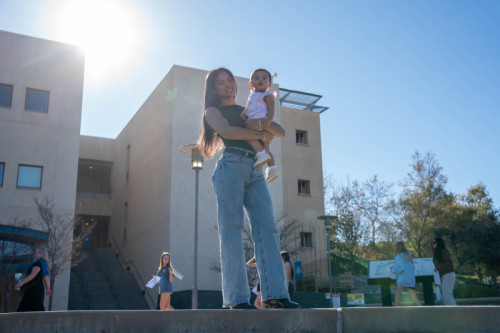
- CEO’s Classroom Experience, Family Legacy Fuel $10M Gift For Hunter HallGreg Hunter never wears a suit to his abstract algebra class at Cal State San Marcos. So when he walked in dressed up one evening, his classmates teased him for being “all dolled up.” Few would guess that he is the CEO of Hunter Industries, a global organization and the largest private employer in San Marcos – or that the company is also a longtime philanthropic partner to CSUSM and is recognized on the campus founders’ seal. To them, he’s just Greg, a student who slips into class with the ease that comes from sharing four semesters with his classmates. “Greg is effortlessly humble, which is so refreshing,” fellow student Travis Bourdon said. “We knew he was a professional but had no idea of the scope. He fits right in, has made friends and encourages us to think about complex concepts differently.” A lifelong learner and Cornell University graduate, Hunter enrolled at CSUSM to challenge himself and strengthen his analytical skills. But the experience quickly became something more as he found himself inspired and motivated by the students around him. “Their grit, backgrounds and excellence impress me, as does the passion and engagement of the faculty,” Hunter said. “CSUSM is a special place with a clear commitment to advancing social mobility and student success across the region. It means a great deal to continue my family’s legacy of support.” This experience, combined with the family’s longstanding commitment to CSUSM, inspired a transformational $10 million gift to fund a new STEM facility. Recently approved by the CSU Board of Trustees, the building will be named Hunter Hall of Science and Engineering and is scheduled to open in fall 2027. Hunter Hall will boost engineering enrollment from 500 to nearly 2,000 students, strengthen the region’s workforce pipeline and support economic growth. “We are deeply grateful to the Hunter family and Hunter Industries for this extraordinary gift,” President Ellen Neufeldt said. “Greg’s experience in the classroom gives him a unique perspective on our students, many of whom are the first in their families to graduate from college. Hunter Hall will be a landmark addition to campus, providing state-of-the-art STEM facilities, fueling regional innovation and strengthening pathways for future graduates.” The Hunter family has helped shape CSUSM’s history for three generations – including Greg’s grandparents, parents and aunt, Ann Hunter-Wellborn, who served on CSUSM's University Council before the campus was founded and has continued to advocate for many student success programs. Over the years, Hunter Industries has supported several pivotal projects, including the Clarke Field House, University Student Union, Hunter Design Lab and state-of-the-art physics laboratories. The company also provides internships, mentorship and faculty support, and employs many CSUSM alumni. As for balancing coursework and running a global company, Greg approaches his studies with the same focus and dedication that define his leadership. “Greg is an exceptional student,” mathematics professor Hanson Smith said. “He even makes time for office hours, which is remarkable for someone who is also a CEO. Students are typically career-focused. Greg already has an extraordinary career, yet he’s here because he loves learning, which is likely what makes him such an effective leader.” With the Hunter gift, CSUSM’s “Blueprint for the Future” campaign – the university’s most ambitious fundraising effort – has raised nearly 80% of its $200 million goal. The campaign reflects the university’s continued growth and its commitment to advancing social mobility across the region. Explore Blueprint for the Future to see how CSUSM is different by design. Media Contact Eric Breier, Interim Assistant Director of Editorial and External Affairs ebreier@csusm.edu | Office: 760-750-7314
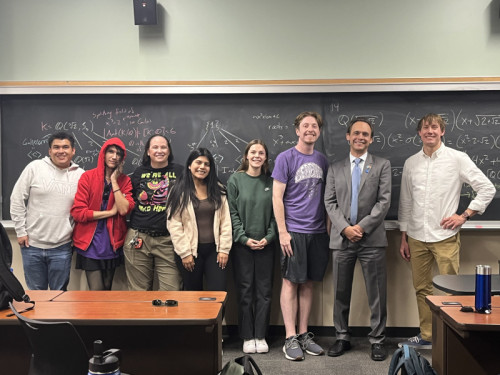
- Finding Growth Through Patience, Campus InvolvementUnlike most children, Quetzalli Johnson wasn’t afraid of visiting the dentist. When she was growing up, her mother always made dentist trips a positive experience for Johnson and her brothers by offering them rewards for doing well in the office. Those positive childhood moments led Johnson to dream of working in health care and dentistry. Today, Johnson is one step closer to fulfilling that dream. “I’m so excited. I feel like the finish line is right there,” said Johnson, a fifth-year general biology major and pre-dental student who's graduating from Cal State San Marcos this month. “I’m really excited to navigate the world outside of school, spend time with my family and husband, and start working as a dental assistant during my gap year.” Along with a gap year to gain experience, Johnson plans to move to North Carolina with her family. She hopes to attend her top choice, the University of North Carolina, to study dentistry and become a dentist. Johnson was an active member of the Pre-Dental Society at CSUSM. She joined the campus organization in spring 2024 and became the social media officer during the 2024-25 academic year. Her efforts in the club helped her achieve the role of senior president this fall. “Being a part of that club taught me a lot about confidence and allowed me to be really comfortable speaking with other students,” she said. “I loved the leadership roles because of what they brought out in myself, and I loved being able to help and support others.” Not only did the Pre-Dental Society give Johnson a place where she belonged, but it also helped her understand the path to dental school. As club president, Johnson has tried to make clear to newer members that they should take their educational journey at their own pace. She often talks about her experience as a fifth-year student and how that extra time has benefited her academically. “I feel like a lot of members think they need to graduate within a certain time, because in high school that’s what we’re told,” Johnson said. “We’re told, ‘You have to graduate college in four years,’ and sometimes that can be a little discouraging. I think it's nice for the members to hear that I’m a fifth-year and see that I’m not defeated by it. I’m enjoying the ride.” Johnson also works hard to make the Pre-Dental Society a welcoming place for students. She encourages members to ask questions, informs them about volunteer opportunities and helps them connect with academic resources and see what lies ahead on the path to dentistry. Her passion for creating and fostering a loving environment is evident to her peers and professors. James Kezos, an assistant professor of biology, has worked closely with Johnson in the classroom and lab. “She is a very determined, hard-working and compassionate individual who has set high goals for herself,” Kezos said. “She is willing to learn and help with any task, showing exceptional levels of initiative and dedication. She excels at whatever responsibilities she undertakes, including her classwork, her research and her extracurriculars such as being president of the Pre-Dental Society.” In the Fly Lab with Kezos, Johnson began studying the physiological adaptations to chronic high-sugar diets in Drosophila (fruit flies) and how these diets affect their heart health and lifespan. Johnson explained that because Drosophila share many genetic traits with humans and have such a short lifespan, they’re ideal subjects for biological study. Alongside the study on high-sugar diets, Johnson has analyzed the Hedgehog signaling pathway in Drosophila heart function. “If we’re discovering new things that could help someone else’s future research, if it could be applied in any way and help the human population, I think that’s really neat,” Johnson said. “I love that we’re taking steps forward to potentially help people. That’s what I want to do in my future, help people.” As the Fly Lab’s sole data analyst, Johnson works closely with the flies’ heartbeats – noting that, in some cases, the flies have a fluorescent heart – by watching videos and turning that information into data through programs like Microsoft Excel. “The biggest impact she has made has been her efforts in implementing a large statistical code to process and analyze our fly cardiac videos,” Kezos said. “Without her help, we would not be able to analyze any of our data, and probably would be struggling with fixing the code.” Creating the code was a challenge that Johnson felt confident in tackling. She had data analysis experience from EOS Fitness, where she worked as a data coordinator. She also took a class on biological data analysis, so when Kezos mentioned that he had code that needed fixing, Johnson was quick to take on the project. It took Johnson roughly two months to go through the nearly 3,000 lines of code. She watched thousands of videos, quantified the data and made it possible for the lab to analyze all of their hard work. Johnson referred to the project as the ultimate puzzle. “It was so frustrating but also really rewarding,” she said. “That went beyond what I thought I was capable of, and just having the belief in myself that I could achieve that, it was such a rewarding feeling. It also strengthened my confidence in myself; I am capable of doing something like that. That was super empowering for me.” Johnson has used these new skills to teach other students in the lab how to use the code to analyze data. “Quetzalli has been an integral member of my lab, and has been a tremendous help in establishing the data analysis process,” Kezos said. “Without her efforts, initiative and care, we would not be as productive as we are today.” When looking back on her time at CSUSM, Johnson said her biggest advice for future students is to get involved. Transferring from Palomar College, Johnson thought she could handle everything on her own at CSUSM. She wasn’t thinking about joining clubs or finding community. But as she delved deeper into her coursework, she realized there was much she still needed to learn about the path ahead. She first heard about the Pre-Dental Society in a Biology 101 class, and the timing felt right. She decided to go to a meeting, and the organization ended up giving her the guidance and support she hadn’t realized she was missing. “I attended a meeting and thought, ‘This is so helpful,’ ” Johnson said. “Then, while I was at these meetings, I saw this community and the relationship between officers and members. I was like, ‘I really want to be a part of this,’ which was new for me. I had never felt like that before.” Being a member of the Pre-Dental Society and volunteering with the Fly Lab helped Johnson grow as a student. The knowledge she gained from both, combined with community support, helped her see how she could give back. Johnson’s newfound desire to get involved led her to participate in events such as the Student Poster Showcase. She presented a poster on the physiological responses to chronic high-sugar diets in Drosophila, the research she had done in the Fly Lab. “Get involved, because it doesn’t hurt; it only helps. You build such a great community and you learn so much. You’re able to meet like-minded people and grow as a human being,” she said. “Enjoy the ride. Enjoy where you’re at in the moment. Enjoy the people around you. Slow down and just enjoy where you’re at.” Media Contact Eric Breier, Interim Assistant Director of Editorial and External Affairs ebreier@csusm.edu | Office: 760-750-7314

- Cancer Survivor Spreads Awareness Through LegosWhen asked why he wants to be a doctor, Cristian Alvizo would often answer, “Because I like science and I love to help people.” But there was always so much more hidden behind that answer, including a diagnosis that altered Alvizo’s entire outlook on life. It wasn’t until he met one of his colleagues and mentors in a lab at Cal State San Marcos that Alvizo realized he needed to change his answer to that question. Alvizo was diagnosed with testicular cancer the day before his high school graduation. He attended a physical required for his high school golf team that didn’t thoroughly examine for testicular cancer. After his appointment, he felt the need to self-screen, and that’s when he noticed something was off. He requested another appointment – disguising it as an HPV vaccination so his parents wouldn’t worry – where he was advised to receive an ultrasound and meet with a urologist. After a month-and-a-half of anxiously waiting, Alvizo met with Jeffrey Zeitung, a urologist at the Scripps Clinic in La Jolla, who delivered devastating news: Alvizo had testicular cancer and needed an orchiectomy, which is the removal of one or both testicles. Alvizo remembers thinking: “I'm 18, I graduate tomorrow, my mom is in the waiting room, I was just told I have testicular cancer and now I have to get an orchiectomy next week. This is a lot at once.” But Zeitung made Alvizo feel comfortable in a very uncomfortable situation, assuring him that they would get through this diagnosis together. He guided Alvizo through the process, teaching him about the disease and comforting him with the knowledge that 99% of testicular cancer patients end up fine. “Seeing how my urologist comforted me during this time made me want the privilege to be in that same position for other patients as well,” Alvizo said. “It inspired me to move down the path of becoming a physician.” Since his diagnosis, Alvizo, who is graduating from CSUSM this month with a bachelor's degree in biology and a minor in Spanish, has involved himself in numerous opportunities to further his education and spread awareness for cancer patients. His biggest contribution has been the creation of a nonprofit organization called Bricks for Change. Started by Alvizo and a few friends, Bricks for Change aims to spread awareness for all types of cancer. “You usually hear about Breast Cancer Awareness Month, which is in October, and outside of that, maybe Childhood Cancer Awareness Month in September. But you don't often hear about the other ones, so our goal is to spread awareness for the cancers of every month,” Alvizo said. The nonprofit raises money to donate Lego sets to kids in the hospital with cancer. Since the organization launched in October 2024, it have donated 550 Lego sets ($9,000 total value) between Rady Children’s Hospital in San Diego and MemorialCare Miller Children's & Women's Hospital in Long Beach. Included in every child’s Lego set is a card that allows patients to share a photo of themselves with the set they built. The pictures are posted to the Bricks for Change Instagram page and website with clearance from the hospital. Alvizo plans to continue this organization for the rest of his life and is working toward making it a 501(c)(3) nonprofit to attract the involvement of larger companies and more funding. He also hopes to build connections with more hospitals as he begins medical school. This isn’t the only advocacy Alvizo has done for cancer awareness. He is heavily involved with the Testicular Cancer Awareness Foundation and ran his first marathon to raise money for testicular cancer awareness. Since then, he has found a passion for running and has completed seven marathons and 19 half-marathons for various charities. He has been asked to speak at the American Urological Association on behalf of the Testicular Cancer Awareness Foundation. Alvizo is finishing his last semester at CSUSM, where he has been a member of professor Julie Jameson’s biology lab since he was a senior in high school. After reaching out to her via email while in high school, Alvizo was invited to join her lab, in which they studied inflammation in the skin relating to various diseases like psoriasis and obesity. Alvizo co-published two scientific papers during his time in the lab and traveled with his lab colleagues to conferences to present their findings. Alvizo is also a STEM ambassador for CSUSM's Center for Research and Engagement in STEM Education (CRESE). Every week, CRESE ambassadors visit middle and elementary schools in the region to lead after-school programs and STEM-based projects to get kids interested in science. In addition, they staff a booth every March at Super STEM Saturday, which is where Alvizo first found his love for science as a middle schooler many years ago. Clinical experience is required to apply for medical school, so Alvizo has been interning at Palomar Hospital for the last two years as a weekly hospice volunteer. He has worked on both the ICU floor and in the emergency department, checking in on patients and providing them comfort. Alvizo also is in the process of obtaining his EMT license so he can transition into a paid clinical position during his gap year before medical school applications open in June 2026. Recently, Alvizo has had the opportunity to shadow Aditya Bagrodia, a urologist researching testicular cancer tumor markers in the blood at UC San Diego, as well as urologist Ramdev Konijeti, who works closely with Alvizo’s urologist at the Scripps Clinic. “It's been a privilege to have a full-circle moment where I'm at the same cancer center, in the exact same room I was diagnosed, but now I get to see it from the other way around. It's really surreal,” Alvizo said. So now, when asked why he wants to be a doctor, Alvizo isn’t hesitant to tell his story. He is reminded of words from a former lab colleague, Alex Gonzalez, who is also a cancer survivor: “Every cancer patient has their own story. Just even hearing a diagnosis of cancer is a big deal. But you have a way of advocating that a lot of other people don't because you are young and healthy. Your interest in becoming a doctor will go a long way for spreading the word about cancer awareness.” Which is exactly what Alvizo plans to do. Media Contact Eric Breier, Interim Assistant Director of Editorial and External Affairs ebreier@csusm.edu | Office: 760-750-7314
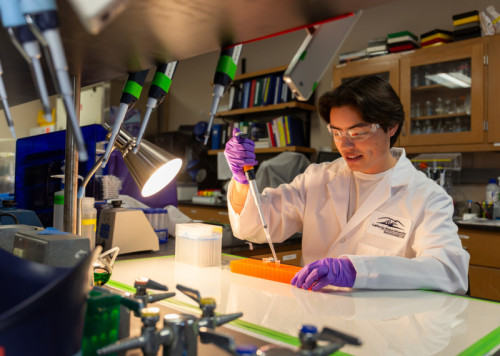
- Youth Lego Challenge Puts Archaeology Professor in DemandFor Jon Spenard, the start of this school year was hectic beyond the typical reasons – and beyond his wildest imagination. Spenard, you see, is an archaeology professor at Cal State San Marcos, and it was in about late August that archaeologists from around the world suddenly found themselves being bombarded with attention. As Spenard can attest, that’s not the normal reality for a scholar in his field. The reason for the surprising interest in archaeology? In August, the FIRST (For Inspiration and Recognition of Science and Technology) Lego League Challenge – an international competition for elementary and middle school students that attracts almost 700,000 kids – released its annual theme: “Unearthed.” As the website states: “Every artifact we uncover holds a story. Each tool, each innovation, each work of art connects us to the people and ideas that came before us. Using STEM skills and teamwork, today we can dig deeper into discoveries than ever before.” Almost overnight, Spenard was on speed dial. “No one was expecting this,” Spenard said. “Every archaeologist and museum I know was suddenly flooded with calls and messages requesting meetings.” So it was that on the afternoon of Nov. 24, Spenard met with a FIRST Lego League team named Bikini Bottom Brick Builders – three middle school girls from Temecula and their parents – in the Social and Behavioral Sciences Building. The team was trying to build a LiDAR scanner – an acronym for “Light Detection and Ranging,” LiDAR is a remote sensing method for creating 3D models of the real world – and Spenard talked to them about how the technology works, how it relates to archaeology and how they could use their newfound knowledge to make better scans. That consulting session was the latest of about a dozen that Spenard has conducted this semester – some on campus, some by email, some at a public archaeology event that he attended in October (Arch in the Park in San Diego). “The groups and their parents do deep research,” he said. “I think many found me through our departmental website.” Each year, the FIRST Lego League introduces schoolkids to a scientific and real-world challenge that will be the focus of their research. The competition involves designing and programming robot prototypes with Legos to complete tasks, and working out a solution to a problem related to the theme. The students meet for regional, national and international tournaments to compete, compare ideas and display their robots. Spenard’s assistance to teams in the region has run the gamut, from conveying the general nature of archaeology – hint: as he says, “it’s not dinosaurs!” – to listening to presentations to providing feedback on early design prototypes. Though wholly out of the blue, the experience has been a rewarding one for him. “My hope, more than anything, is that these kids have walked away with a much better understanding of what archaeology is and how it is done,” Spenard said. “My impression is that, collectively, these kids are doing amazing engineering work that will revolutionize the field of archaeology and many others someday.” Media Contact Brian Hiro, Communications Specialist bhiro@csusm.edu | Office: 760-750-7306
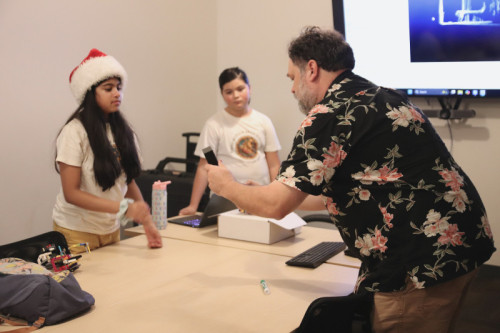
- Record-Breaking Giving Day Raises More Than $820KCal State San Marcos celebrated another record-breaking Giving Day this year, raising $828,397 from 2,444 gifts in just 24 hours. The total raised on Dec. 2 was $80,000 more than the previous record set last year. Giving Day is part of Giving Tuesday, an international day focused on philanthropy. The Giving Day highlights included: A number of matches were met, including $200,000 from the Epstein family, $10,000 from SchoolsFirst Federal Credit Union, $5,000 from North City and more than $100,000 in individual area frontline matches, benefiting 132 campus programs. 56 ambassadors brought in 329 gifts. Students made 318 gifts. Nearly one in five gifts came from alumni, who supported 119 programs, departments, colleges or scholarships. Every gift counts toward the university’s “Blueprint for the Future” fundraising campaign, the largest in CSUSM’s history. The campaign’s theme reflects both the physical growth on campus and the forward momentum building at CSUSM as one of the CSU system’s fastest-growing campuses. Founded in 1989, CSUSM serves 17,000 students and is proud to be ranked No. 1 in the nation for advancing social mobility. Media Contact Eric Breier, Interim Assistant Director of Editorial and External Affairs ebreier@csusm.edu | Office: 760-750-7314
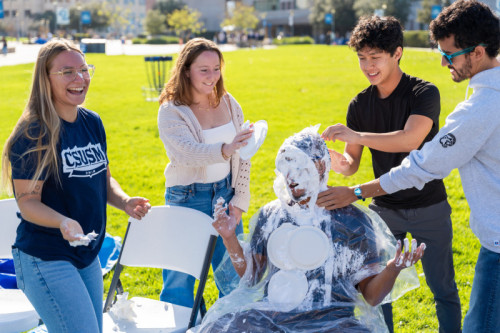
- Faculty and Staff Secure Funding Across DisciplinesFor education professor Rebecca Brooks, receiving $2.5 million in grants to expand the Aspiring Scholars program is a dream come true. “It’s incredibly meaningful to give students with intellectual disabilities an inclusive college experience,” Brooks said. “My greatest hope was to obtain funding to expand our cohort size and ensure the long-term sustainability of this program. These grants make that vision a reality.” Funding at this level is highly competitive nationwide, yet faculty and staff at CSUSM like Brooks continue to stand out, securing awards that support innovative projects and create transformational experiences for students. “Our faculty and staff are pursuing some of the most-sought-after grants in the nation, alongside leading institutions,” said Charles De Leone, dean of graduate studies and research. “It’s exciting to see their ideas recognized and to watch how their work enriches our students’ experiences, strengthens our campus and serves our broader community.” Examples of projects funded this academic year include: Supporting chemistry and biochemistry students: A $2 million grant from the National Science Foundation will fund student scholarships in chemistry and biochemistry as well as a Vertical Mentoring Learning Community (VMLC). Led by Robert Iafe, Afra Panahi and Aswad Allen, the program blends mentoring, research opportunities and priority enrollment for up to 30 students each year, with eight first-year students eligible for renewable $15,000 scholarships. Making exercise more accessible: Kinesiology professor Todd Astorino received a $442,590 grant from the National Institutes of Health (NIH) to explore how reduced exertion high-intensity interval training (REHIT) – two short 20-second sprints within a 10-minute workout – can improve health and make exercise more attainable for inactive adults. Expanding mobile making in local schools: Funded by the National Science Foundation, this project led by Edward Price, April Nelson and Sinem Siyahhan of the Center for Research and Engagement in STEM Education (CRESE) expands the university’s Mobile Making program. Through after-school “making” clubs across North County, undergraduate STEM ambassadors bring hands-on activities and equipment to schools, libraries and community centers. Helping students with intellectual disabilities experience college: Brooks and psychology professor Allison Jobin received $2.5 million in grants to expand Aspiring Scholars with full-time staff, a dedicated campus space and additional peer mentors. Adding water refill stations: A grant from CalRecycle will enable CSUSM to reach its goal to have a water refill station on every floor of every building. Led by Juliana Goodlaw-Morris, director of sustainability and climate justice, in partnership with Facilities Development & Management, this grant will fund 10 new water refill stations and replace five older stations across campus. The project’s progress will be measured through station usage, recycling volumes and waste audits. “Each of these projects reflect the spirit of innovation and collaboration at CSUSM,” De Leone said. “They also give students meaningful opportunities to engage in hands-on research that prepares them for their future careers.” Research funding is an integral part of CSUSM’s “Blueprint for the Future” campaign, helping advance the university’s $200 million goal through both philanthropy and grants. Media Contact Eric Breier, Interim Assistant Director of Editorial and External Affairs ebreier@csusm.edu | Office: 760-750-7314
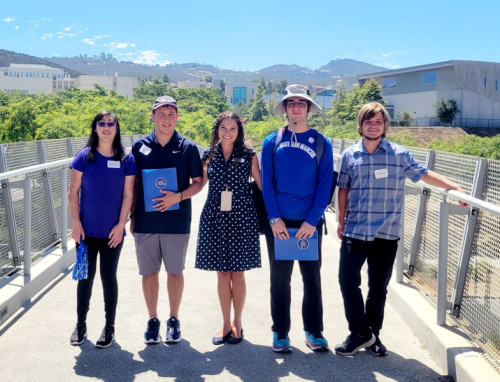
- Ohio University Fellows Join CSUSM Students for Collaborative Leadership SessionStudents from Cal State San Marcos had the chance to connect with students from Ohio University during a collaborative class session that highlighted shared experience, leadership and cross-campus engagement. The Center for Leadership Innovation and Mentorship Building (CLIMB) hosted the students from Ohio as part of its signature In the Executive’s Chair (ITEC) series. Rajnandini “Raj” Pillai, director of CLIMB and a professor of management, explained that the course brings students into direct conversation with influential leaders and creates meaningful opportunities for interaction with peers worldwide. “CLIMB always believes in collaborating with other entities on campus as well as other universities, both domestic and international, especially when it pertains to our speaker series for the community or our signature In the Executive’s Chair class,” Pillai said. The Nov. 4 visit included a joint class session featuring Jordan Marks, San Diego County assessor, as well as an informal conversation and lunch on campus. The Ohio University students spent the afternoon exchanging insights with CSUSM students about academics, career plans and student life. CLIMB was established in 2004 by CSUSM’s College of Business Administration, with the mission of fostering the development of effective leaders at the individual, team, organizational and community levels. The center focuses on promoting innovative leadership and research through educational programs and mentoring opportunities. The ITEC series brings high-level leaders from diverse industries to speak with students about topics such as communication, decision-making, ethics and professional development. Previous cohorts have included international participants, such as master’s students from Sweden who joined ITEC via Zoom. Ohio University students also visited CLIMB over the summer. During this visit, the Raymond A. Lancaster Executive Leadership Fellow, Dan Squiller, said the experience exceeded expectations. “The feedback from our students was uniformly positive,” Squiller said. “This first engagement and eating lunch on a sun-soaked CSUSM campus was the perfect way to kick off their week of sessions in San Diego. So, thank you for orchestrating our inclusion, handling the logistics and making us feel so welcome.” Pillai said she hopes to continue the partnership and host the leadership fellows annually, noting that opportunities like these enrich the classroom experience and strengthen CLIMB’s commitment to developing leaders through connection, conversation and community. CSUSM students also reflected on the value of the exchange. “Talking with the Ohio University students during class was a really interesting experience because it showed me how, even though we go to different schools, we share a lot of the same goals and challenges,” Lysandra Lyman said. “The main difference I noticed was in the size and culture of their school, which gave them different kinds of opportunities. But overall, it made me realize how much we all relate to each other when it comes to learning, growing and preparing for the future.” Media Contact Eric Breier, Interim Assistant Director of Editorial and External Affairs ebreier@csusm.edu | Office: 760-750-7314
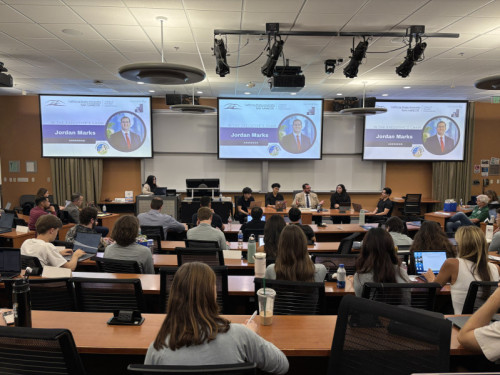
- Spanish Professor Makes Feature Film DebutUntil recently, Darci Strother’s acting career consisted entirely of playing the lead role of a hippopotamus in one play. This was in third grade. So imagine her surprise when director Antonio Muñoz de Mesa approached Strother – a Spanish professor in the Cal State San Marcos modern language studies department – about playing a significant role in his international revenge action film, “Santa Zeta.” “He wanted someone who looked fairly innocuous, kind of like a soccer mom,” said the 59-year-old Strother, who has taught at CSUSM since 1993. “He wanted someone to surprise the audience who looked like your everyday innocuous person who would actually be a villain.” The Spanish film wrapped in 2024 and recently hit the film festival circuit, which included winning the Award of Excellence in the feature film category at the third annual Santa Barbara Indie Film Festival in September. The film made its U.S. debut at the festival. CSUSM’s Global Commitment Committee will screen it as its featured film March 9 in the University Student Union. De Mesa has agreed to join the discussion for the screening, either in person or via Zoom. “Santa Zeta” was filmed in Spain and South Korea, with Strother’s scenes shot in San Marcos. Her scenes are listed as being filmed in Escondido because Escondido means “hidden” in Spanish, and it’s a play on words for the many hidden meanings within the movie. The film’s synopsis (from IMDb): “A super famous travel influencer, Santa Zeta, uses her social media as a cover to travel the world hunting pedophiles, obsessed with finding her little sister’s killer.” Strother plays the role of Amelia, a seemingly innocent woman with a sinister side. “I caught the bug of embracing other new challenges,” Strother said. “I think when you’re asked to do something difficult, you’re not sure if you can do it. And then you do it, and it turns out well. That gives you the confidence of, ‘Well, I wonder what’s next.’ ” Strother spoke on the panel after the Santa Barbara screening, which was attended by her family along with de Mesa, the production manager and other cast members. The film was the feature event Friday night for the weekend’s festivities. In addition to teaching and service, every CSUSM tenure-track faculty member must perform research and creative activity as part of their duties. For Strother, before 2024 that consisted of writing academic articles and books about 17th-century Spanish theater. What the film experience gave her was a new perspective on viewing the creative process of cinema. She said she was thrilled to be on the panel for a Q&A session after the debut screening so the audience could see her true personality. “I play a very unflattering character,” she said. “I play a character who does something evil, despicable things. It was kind of exhilarating. I was able to step outside of myself and say, ‘Oh wow, I really did that.’ It’s an accomplishment I achieved in life that lives there forever.” De Mesa has 48 credits to his name on IMDb, including actor, director, producer, writer and editor. As the director of “Santa Zeta," he knew immediately that he wanted Strother for the role despite her lack of acting experience. They had connected many times when Strother was presenting research in her area of expertise. “Although Darci didn't have experience as an actress working in films, I knew her for many years and was totally sure that she could perform this role with the help of an acting coach,” said de Mesa, who was born in Madrid. “I needed an actress for the role of Amelia with a calm, intelligent energy. That's why I thought of Darci right away. Her sensibility and closeness to the acting community made it super easy to work with her in her sequence.” The request from De Mesa came at what can only be called an inopportune time. Strother had just begun caring for her daughter, who was recovering from what Strother described as a serious surgery. In the same week, she also had been asked to moderate the Global Commitment Committee’s informal conversation with students leading up to the 2024 presidential election. She was acting as GCC’s interim chair. And she had been asked to substitute teach for a class of a subject she “really didn’t know.” “All of these things that came together made me actually feel weirdly relaxed because it felt like, OK, life is throwing me all these curveballs and opportunities, and I'm not expecting of myself to do anything more than what I can do,” Strother said. “I think if I had only done the film that week, I would have just been obsessing and worrying about it. Because there were so many things going on, I was taking things one step at a time – 'I'm going to do it,' and everyone in the cast and crew made me feel really relaxed.” Faculty in the College of Humanities, Arts, Behavioral and Social Sciences are often looking for new avenues to create and innovate – to go beyond the classroom to share experiences that inspire and introduce career paths beyond a straight line. Earlier this semester, Strother showed some still photographs from the film and pictures from the festival to her classes. She presented the images from the perspective of doing big things when you’re not expected to. Particularly when it comes to art, she wanted her students to understand that it’s never too late to take risks. Even a faculty member with decades of experience in academia can become a screen actor. “It was very unexpected, but I’m kind of at that point in my life where if someone asks me to do something and I don’t think I can do it, I say, ‘Sure, why not? I’ll try it anyway,' ” Strother said. “I might succeed, I might not succeed. I have the luxury of being at a point in my career where I can try new things and take risks.” Media Contact Eric Breier, Interim Assistant Director of Editorial and External Affairs ebreier@csusm.edu | Office: 760-750-7314

- Double Alumna Pays It ForwardGrowing up in Mira Loma, a rural community in Riverside County, double alumna Amy Barrera remembers cows and few examples of social mobility. “We never heard about people going to college,” said Barrera, who earned a bachelor's degree in human development in 2018 and a master's in public health in 2024. “If it weren’t for Upward Bound, I wouldn’t have known it was a possibility for me.” Through Upward Bound, a program that helps low-income and first-generation high school students prepare for college, Barrera received academic support, mentoring and help with applications. When Barrera arrived at Cal State San Marcos, she discovered a community that was both welcoming and unfamiliar. “I met an international student for the first time," she said. "Back home, everyone is Hispanic. It was so interesting to be in a place that celebrated diversity. The campus and the student life centers showed me that there’s a place for everyone.” After earning her bachelor’s, Barrera began working in health-related fields and discovered a passion for research. Returning to CSUSM for her master's helped her refine that passion and find belonging. “That’s when I really felt seen as a Mexican-American researcher,” Barrera said. Receiving a scholarship from the CSUSM Alumni Association was another milestone. “The money was helpful, but more importantly, being selected was super validating,” she said. Today, Barrera works at Pacific Lutheran University in Tacoma, Wash., and hopes to pursue a doctorate in public health. As an employee benefit, she was able to create a will and decided to include a $10,000 scholarship for public health students at CSUSM. “Making a will was so easy, a lot easier than I thought, and I’m extremely grateful to be in this position to give back,” Barrera said. Supporting students like her and the public health field is at the heart of Barrera's motivation to give. Asked what she’d tell future recipients of her scholarship, she doesn’t hesitate. “You received this scholarship for a reason," she said. "There are people out there who see your potential and have invested in it. Lean into that and trust your capabilities to do incredible things. Keep going!” How You Can Support Future Students in Your Estate Plan Barrera’s story is a powerful example of how anyone, at any age, can help future students thrive. Gifts in estate plans – through wills, trusts or retirement accounts – can be changed by the donor at any time, and there are many possible planned giving options to suit your needs. Gifts at all levels make a difference for students. “I want young people to know it’s easier than they think,” Barrera said. “Even with modest assets, you can still set up a planned gift. You don’t have to wait until later in life.” To learn more about planned gifts, contact P. Vien Walker, director of planned giving, at 760-750-8138 or vwalker@csusm.edu, or visit plannedgiving.csusm.edu. Media Contact Eric Breier, Interim Assistant Director of Editorial and External Affairs ebreier@csusm.edu | Office: 760-750-7314
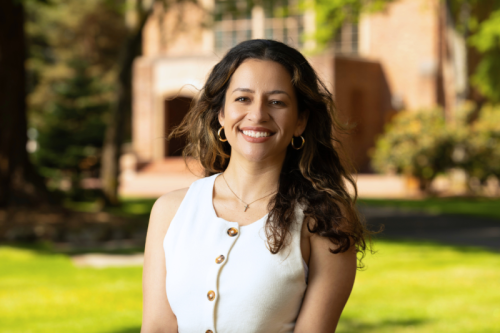
- Pawsitive Influence: Frank the Facility Dog Turns 3A member of the Cal State San Marcos family is about to celebrate a special birthday. Frank the Facility Dog will be turning 3 years old on Saturday. To celebrate, Frank had a special birthday party in the third-floor lobby of Kellogg Library on Thursday. Nearly 100 students came by to wish the party animal a happy birthday just before U-hour. Frank’s party included cupcakes and candy for the guests and photos with the birthday boy. He even received a special visit from the Cougar Care Network cart, a special birthday handkerchief and an outfit from some well-wishers. Frank, a goldendoodle, is a therapy and facility dog. According to his mom, Tracy Daly, a CSUSM kinesiology lecturer and registered dietitian/nutritionist and sports dietitian, he is a beloved member of her family. She said Frank’s presence is just the present CSUSM needs. “He is bringing a lot of joy to students who are struggling or stressed,” Daly said. “And not only students, but faculty, staff and administrators.” Just this semester, Daly said, Frank has completed more than 1,500 visits, supporting mental health and building community connections. Animal-assisted therapy has shown significant reductions in both psychological and physiological stress, a recent study found. “A lot of folks on this campus are away from home, and they might be missing their dog,” Daly said. “I’ve had a lot of students tell me they recently lost their dog or they’ve had loss in their family, and they come visit Frank and he’s just this warm, fuzzy ball of love.” Vera Lee, a junior nursing major, agreed. “I met Frank during a class Tracy was doing and started following him on Instagram,” Lee said. “Frank brings me a lot of joy and helps me during the stressful times. I see Frank three times a week, and I recommend that anyone who loves dogs or animals or who has pets they’re not able to see come by and visit Frank.” Frank is fully trained and certified as both a therapy and facility dog through Pawsitive Teams and Love on a Leash. His work aligns strongly with CSUSM’s values around well-being, belonging and student success. “What we found is that Frank has a very good demeanor when it comes to therapy work,” Daly said. “He passed his canine good citizen test with flying colors.” Frank was certified as a therapy dog in just eight weeks. His journey to CSUSM took more than a year – starting with the kinesiology department; working his way through to Integrated Risk Management; the Office of Safety, Health and Sustainability; all the way up to the provost. That journey was worth it, Daly said. “I see the changes in students’ faces when they come out and hang out with him,” she said. During the fall semester, people can come by and visit Frank on Mondays from 12:15-2:15 p.m. in front of Kellogg Library, on Tuesdays from 11:45 a.m. to 12:45 p.m. at the Epstein Family Veterans Center and on Thursdays from 11:30 a.m. to 12:45 p.m. in the library's third-floor lobby. Media Contact Brian Hiro, Communications Specialist bhiro@csusm.edu | Office: 760-750-7306
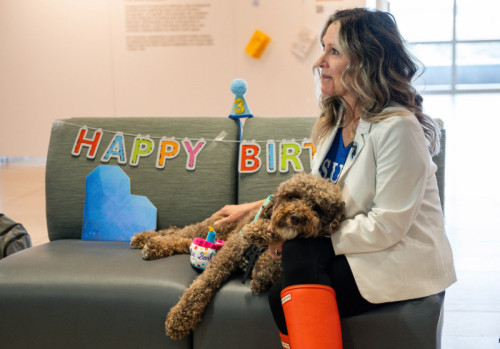
- Alumnus Returns to Nest as Head of New American Indian Student CenterJoely Proudfit arrived as a professor at Cal State San Marcos in 2008 – before she became chair of an American Indian studies department that then didn’t exist, before she founded an on-campus center devoted to California Indian culture and sovereignty. That fall, Proudfit taught a course called “Native American Communities.” It was a small class, featuring only about a dozen students. One of them stood out immediately. Proudfit had known the family of Tommy Devers for years. They are both Luiseño Indians, and Tommy’s uncle is Chris Devers, the former chairman of the Pauma Band of Luiseño Indians, who has deep ties to CSUSM. But that didn’t prepare her for what she would encounter in Tommy. “I noticed his commitment and curiosity right away, but what struck me more deeply was the way he carried himself in service to his community,” Proudfit said. “His hands were always in the work. He showed up for his people with a sincerity that you cannot teach. “There is simply a light to him. My husband used to joke that Tommy should be the mayor of whatever town he happened to live in because he is just that kind of person: engaged, grounded, generous and easy to gravitate toward.” After graduating from CSUSM with a degree in communication in 2009, Devers went on to complete a master’s program in sociological practice, bolstering his connection to the university. During that time, he further immersed himself in Native studies, and even helped Proudfit move into the new California Indian Culture and Sovereignty Center (CICSC). About a year ago, then, when a job as the first leader of a planned American Indian Student Center became available, Proudfit had the ideal candidate in mind. “Tommy,” she said, “was exactly the person we needed.” And Devers was exactly the person CSUSM got. Hired as assistant director in February, the double alumnus spent his first semester observing and developing relationships with American Indian and other students while working out of an office near Proudfit in the CICSC. By late August, he had moved into his new office in the student center, which occupies a suite in the University Student Union that formerly housed the Cross-Cultural Center. This fall, he has overseen five student employees while the American Indian Student Center welcomes in an average of about 20 students per day. Greeting them as they enter is an enormous, wall-sized mural painted by American Indian studies professor Eric Tippeconnic. To make the center more inviting, Devers and his team rebranded it as “The Nest,” both a nod to the center's logo of a feather and a nickname that rolls off the tongue more easily. “This is going to become the nest where students come, they get nurtured, they grow and then they move on in their journey,” Devers said. “So it took on a more symbolic meaning as well. “There's a lot of excitement from the students, and I think they have a strong desire to make this space their own. This is the foundational year. This is when we start being mindful of how we want the center to be, the legacy we want it to have.” The Nest represents the fulfillment of a desire Proudfit has held almost from the day she first stepped foot on campus to give CSUSM’s American Indian students a place they could call their own. Out of necessity, they have congregated over the years at the CICSC on the first floor of the Social and Behavioral Sciences Building. A door opened a couple of years ago when Viridiana Diaz, CSUSM’s vice president for Student Affairs, formed an advisory committee led by lecturer John Tippeconnic, whose report affirmed the need for a dedicated center. The timing lined up perfectly with the availability of Devers, who had moved back to California after some time living out of state and was ready to return to higher education. “He was raised for this kind of work,” Proudfit said. “He is thriving because the job aligns with his spirit, his community roots and his lived commitment to our students.” Devers grew up on the Pauma reservation as the youngest of four children of a Luiseño father and Irish mother. He recalls an idyllic childhood marked not only by normal pursuits such as abundant outdoor play in the rural landscape but also by a stint as an actor. As a fifth-grader, he attended a casting call, which led a trip to acting school, the hiring of an agent and, on his seventh audition, a role in the TV show “Power Rangers.” During middle school, he even moved to Los Angeles for a year with his mom to try acting full-time before concluding that the world of Hollywood was not for him. The sense of adolescent adventure, however, didn’t come without some discomfort related to his identity. “There's definitely some pain that came up because my mom is white and my dad is Indian,” Devers said. “Being half-white on the reservation, you're very aware of your situation at a young age.” After being part of one of the first graduating classes at Valley Center High School, Devers went to Palomar College along with his brother and one of his two sisters. It was a rather aimless period for him. He explored being a photography major. He contemplated becoming an English teacher. He took a semester off to travel, and ultimately stayed at the college for almost four years. “No one who I knew could explain to me what the next steps were,” he said. Devers found direction when he transferred to CSUSM in 2007, and particularly the following year when Proudfit joined the faculty. The American Indian studies discipline hadn’t been created yet, but he took as many classes in that vein as he could. After he earned his bachelor’s degree, Proudfit helped him land a job with the U.S. Census Bureau, for which he leveraged his tribal relationships and cultural knowledge to help boost participation by Native peoples in the 2010 census. The more Devers went down the path of connecting with his heritage, the farther he wanted to go. He began working for his tribe as a youth program coordinator. He came back to CSUSM to earn a master’s and resumed his leadership in the American Indian Student Alliance. “I realized that education was changing my life in a way I never imagined,” Devers said. “The subjects I was learning about were changing the way I thought about things and approached ideas.” Devers was in his second year of the master’s program when the CICSC opened in 2011. Proudfit remembers that it was Nov. 17, the same day she returned from maternity leave. While she was holding her 3-month-old daughter, Piper, Devers and an interior designer friend of Proudfit’s decorated the center in one day on a shoestring budget. “We filled the space with photos of our students and tribal community members, and much of what they created that day still lives in the center now,” Proudfit said. “Tommy has been integral to the CICSC from day one. His labor, his vision, his spirit are all woven into the roots of that space, and I remain deeply grateful.” Fourteen years later, now married with two young children, Devers is integral to a new space for American Indian students. Following a first year in the job aimed at establishing The Nest and making students feel at home, he plans to turn his focus to career pipelines and recruitment. To that end, he’s the lead organizer for the 2026 edition of Dream the Impossible, a Native youth conference that has been held for nearly two decades and is returning to CSUSM in April. More than 500 Native middle and high school students will converge on campus for an event that will introduce them to Native professionals in various fields and tout the transformative power of higher education. Devers knows a thing or two about that. “I have such hope for what this university is becoming,” he said. “The knowledge and kinship that can be gained through American Indian studies, the CICSC, the American Indian Student Alliance and The Nest can have a massive impact in tribal communities. That's what excites me the most. We're developing students who will lead our tribal communities into a future rooted in sovereignty, accountability and cultural strength." Media Contact Brian Hiro, Communications Specialist bhiro@csusm.edu | Office: 760-750-7306
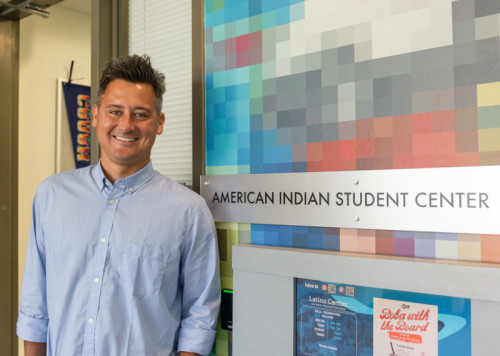
- CSU Economic Impact Report Highlights CSUSM's Vital RoleThe California State University system released its economic impact report today, highlighting the significant role that the CSU and Cal State San Marcos play in driving regional economic vitality, strengthening key industries and preparing a skilled workforce essential to the economy. “The CSU and Cal State San Marcos continue to be among the state’s most powerful engines of economic mobility, opportunity and innovation as their influence extends across industries, communities and generations – especially here in the San Diego region,” CSUSM President Ellen Neufeldt said. “This report shines a light on our collective impact and the powerful role we play to keep our economy strong and thriving in every corner of the state.” “An investment in the CSU is an investment in California,” said Assemblymember Darshana Patel, whose 76th district includes CSUSM. “That’s why it is imperative that we continue to fund public education to ensure that our state remains one of the top economies in the world.” The report, “Moving California Forward: The Economic Power of the CSU,” highlights the lasting return on investment for the people of California at every level, and CSUSM specifically: Economic return: For every dollar the state invested in CSUSM, $18.50 was generated in statewide industry activity. The figure rises to $64.62 when including alumni earnings. Statewide impact: CSUSM-related activity supported 7,900 jobs annually across California and contributed $361.5 million in wages earned. The university’s overall statewide impact reached $923.6 million in industry activity and $69.2 million in state and local tax revenue. Regional reach: As part of the San Diego region, CSUSM helped generate a substantial economic impact – supporting 7,600 jobs annually and contributing $342.8 million in wages earned. The total regional impact was $861.5 million in industry activity and $65.4 million in state and local tax revenue, underscoring the campus’s vital role in regional economic vitality. Workforce power: Nearly half of all bachelor’s degrees in California are awarded by the CSU. At CSUSM, students are prepared for in-demand careers in health care, education, business, biotechnology and public service – fields that power the region and state. Research impact: Despite recent funding challenges, CSUSM’s research initiatives continue to address urgent challenges – from health disparities and environmental sustainability to STEM innovation and social mobility – while contributing to globally significant science and scholarship. Learn more about the economic impact report and CSUSM's impact at https://www.calstate.edu/impact. Download the one-page summary of CSUSM’s economic impact here. Media Contact Brian Hiro, Communications Specialist bhiro@csusm.edu | Office: 760-750-7306
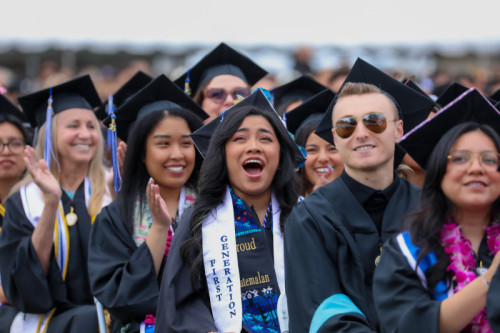
- Grammy-Nominated Music Professor Still Performing and InspiringAfter he stopped touring full-time as a musician several years ago, Aaron Humble increased his pace of sending out feelers to conductors of groups that fly in musicians for a week-long project that often ends in a CD-quality recording. As it often goes, he didn’t hear back from one of the groups he reached out to – True Concord Voices and Orchestra based out of Tucson, Ariz. On a gig months later in Santa Fe, N.M., the Cal State San Marcos associate professor of music was approached by a fellow tenor explaining how a group in Tucson needed another tenor for an upcoming project. Humble booked the trip and enjoyed a week of recording and camaraderie. “The first conversation I had with the conductor was him sort of sheepishly saying, ‘Hey, I’m really sorry that I never responded, but I do really like your audition materials and we’d love to have you sing with the group,' ” said Humble, who is co-chair of the music department and also filling the role of director of the dance studies program. About six years later, a weeklong recording session with True Concord resulted in “A Dream So Bright: Choral Music of Jake Runestad,” which debuted in August 2024 at No. 2 on Billboard’s Classical Albums chart. Three months later, the recording was nominated for a Grammy Award for Best Choral Performance, a realization of a lifelong dream for Humble. True Concord didn't win when the Grammys were held last February. But the experience of recording and, months later, riding the wave of the highest nomination for a recording artist is one that Humble puts high on his list of career accomplishments. And it came with the group that previously had ignored his inquiries. “It’s up there in the top for sure,” said Humble, who has performed at such iconic venues as the Kennedy Center, Lincoln Center and the Library of Congress. “It’s not something you can will to happen because you’re relying on democracy. You’re relying on the members of the (Recording) Academy, the majority of whom I don’t know. And so it does feel like this sort of grassroots recognition of an accomplishment.” In his career as a solo artist, Humble has performed in opera, recital, concert and chamber music venues, enjoying solo appearances with the St. Paul Chamber Orchestra and the Boston Pops. During his tenure singing with Cantus out of Minneapolis, he sang more than 800 concerts and recorded 10 albums with one of the nation’s premier vocal ensembles. CSUSM's School of Arts is making a concerted effort to hire and encourage its faculty to stay active in their respective industries. Ching-Ming Cheng, music co-chair, gives piano concerts both solo and with renowned performers routinely. She just completed a fall series of concerts with cellist Paul Tseng and harpist Vanessa Fountain throughout San Diego County, including on campus and at the California Center for the Arts, Escondido. “Part of it is to feed my artistic soul and sort of keep that fire burning,” Humble said. “Creative activity is part of our scholarship as applied faulty in the arts, so that’s part of it. But in terms of teaching, it also helps me stay relevant. I’m teaching students how to practice, how to perform, and if I stop doing it, I won’t be as good at teaching that.” Originally from northeast Ohio, Humble was the director of choral activities at Minnesota State University, Mankato before coming to CSUSM. A graduate of Millikin University in Illinois, he has a Doctor of Music degree in vocal performance and literature from the Indiana University Jacobs School of Music. Humble and his husband, Xu Zou, have a home in New York primarily for Zou’s work there. Their main residence is in South Park with their two cats, Chopstick and Toothpick. Humble and Cheng are in the process of proposing a music recording and production degree program in the music department. Music technology is currently a minor. “I think that will bring a whole different set of students here as well,” Humble said. “And for the students who are really looking for that ramp into a vocation, into a career, that’s a great degree for them.” His dream is to host a music therapy program at CSUSM. There are no such programs in San Diego, an area rich with the therapeutic power of music. Humble directs the university choir, which is an SATB (soprano, alto, tenor and bass) ensemble that is open to students of all majors and other members of the campus community. The choir does not require an audition. Humble slowly has been building small group opportunities for students who are looking for more advanced repertoire. That’s innovation. For him, it’s about finding the right pace and fit while pushing the students to discover new opportunities within themselves. That’s acceleration and cultivation, the key tenets behind CSUSM’s Blueprint for the Future fundraising campaign, in which the College of Humanities, Arts, Behavioral and Social Sciences lists “Anchoring the Arts” as one of its two initiatives. “I don’t know if we’re quite there yet, but we’re close,” he said. “It’s just nice to give those students who want that extra challenge with harder repertoire, with things that are a little more on the art music side of things and might challenge students in a way that those kids want but other students don’t want. To have space for them to do that.” The concert that the music department is working on this semester is about belonging and unity. Earlier this semester, Humble wasn’t feeling well at choir rehearsal while recovering from getting vaccinated. He ended up having a great rehearsal and left feeling much better. It reminded him that he hears the same from students often. They may arrive to campus in a bad mood but leave their interactions upbeat and ready to go on with their day. Being on the receiving end of that community of care is a gentle reminder that he and other faculty often provide the same. “People need those safe spaces more than ever and those moments of community,” Humble said. “I feel really fortunate that I get to teach in a place that wants that for all of our students. And that I get to make music and build that community in an artistic environment with my students as well.” Media Contact Eric Breier, Interim Assistant Director of Editorial and External Affairs ebreier@csusm.edu | Office: 760-750-7314
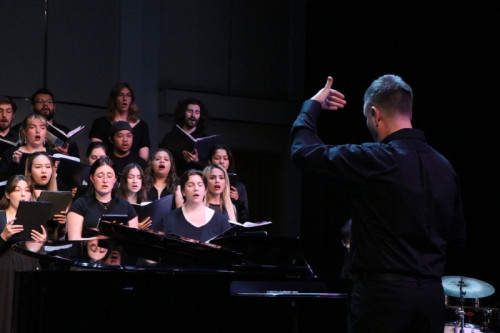
- Construction of New Wellness and Rec Center UnderwayCal State San Marcos held a Construction Kickoff on Nov. 12 to celebrate construction being underway for the Student Wellness and Recreation Center (SWRC), which is expected to open by summer 2027. Approved in a CSUSM student-led referendum last year, the center will be located next to The QUAD housing complex across Barham Drive from University Village Apartments. CSUSM is partnering with Sea Breeze Properties – developers of North City, which includes CSUSM’s North Commons, The QUAD and the Extended Learning Building – on the SWRC, which will be the latest addition to campus life. “This has been a long time coming, and we couldn’t be more proud to be here today,” said Darren Levitt, vice president and partner of Sea Breeze Properties and emcee for the Construction Kickoff. “I don’t know of any other development in the country that includes all of these elements in one project.” The SWRC will have a 10,000-square-foot gym space with strength training equipment and cardio machines, two standard-sized indoor courts and a rooftop deck with a turf field. In addition to the extensive room for student exercise, there will be dedicated wellness areas indoors and outdoors, a commuter lounge and an esports collaboration den. The project also includes additional student housing, with over 900 beds, as well as a central park and retail space. “When students have access to wellness and recreation resources, they thrive, manage stress better, perform stronger academically and feel more connected to their campus,” CSUSM President Ellen Neufeldt said. “That’s what this center is all about.” “When you choose an institution of higher learning as a student, you’re not just choosing a place to learn; you’re choosing a community to live in and live with, and having this very crucial piece of the community be here on campus is going to be an enormous opportunity for our students,” Assemblymember Darshana Patel said. CSUSM’s Campus Recreation students and staff worked hard to advocate for the center. Campus Rec student ambassadors, along with other student groups and organizations, helped make the project a reality by conducting a referendum to ensure that students' voices determined the outcome of the SWRC. “I’ve seen firsthand how much our students have wanted and needed this space,” said Illeana Carmona Chavez, an Associated Students, Inc., leader and former Campus Rec employee who helped lead the student referendum. “Since 2016, students have been advocating for more wellness and recreation opportunities, and we’re making that dream a reality. “This center is about fitness and wellness, but it’s also about belonging. It’s about giving students – especially commuters like me – a place to connect, recharge and feel part of something bigger.” Added San Marcos Mayor Rebecca Jones: “We are very focused on wellness and keeping people healthy, so this could not be more appropriate. San Marcos used to be just known as the educational hub of North County; now we’re known as the health care epicenter. So to have a place like this built makes so much sense.” As CSUSM’s campus continues to grow, buildings like the SWRC are what make all the difference. Providing a space for students to exercise, play sports with friends or simply relax and unwind fosters the sense of community that CSUSM strives for. “This project reflects the power of public and private partnerships – students, faculty, staff, business, government and community coming together to make something extraordinary happen,” Neufeldt said. “Whether students live on campus, commute or call CSUSM home for just part of their day, this center will be their space – a place to recharge, to build friendships and to strengthen mind and body.” Media Contact Eric Breier, Interim Assistant Director of Editorial and External Affairs ebreier@csusm.edu | Office: 760-750-7314

- Women's Basketball Team Opens With WinThe Cal State San Marcos women's basketball team opened the 2025-26 season with a 58-52 victory over Azusa Pacific at The Sports Center on Friday. The Cougars shot 33.3% (20-of-60) from the field and 33.3% (6-of-18) from beyond the arc, while holding APU to 25% from the field and 21.1% from 3-point range. The Cougars also won the rebounding battle 55-41, led by Kaity Haan's game-high 16. Sophie Morales had 15 points, five rebounds and four assists for CSUSM, while teammate Sydney Hani added 16 points and 10 rebounds. The Cougars notched their second win on Saturday, beating visiting Point Loma Nazarene 62-50. CSUSM's next game is Nov. 28 against Northwest Nazarene in the PLNU Thanksgiving Classic. Media Contact Eric Breier, Interim Assistant Director of Editorial and External Affairs ebreier@csusm.edu | Office: 760-750-7314
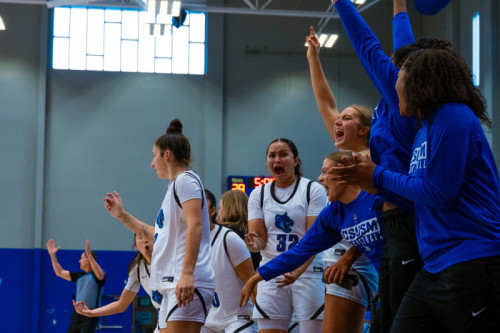
- Grant Helps Expand Interprofessional EducationWhen Tania Chambers was growing up, she often found herself helping her parents navigate new systems, serving as an interpreter, advocate and problem-solver. “From a young age, I helped my family assimilate into our new environment, filling in gaps wherever I was needed as a first-generation Mexican American.” said Chambers, now a Master of Social Work (MSW) student at Cal State San Marcos. “I became their translator, doctor, lawyer and social worker. These experiences shaped why I want to do this work.” She carried that sense of purpose into every role she has served – including preschool teacher, nanny and YMCA educator – and she saw firsthand how communication gaps between parents and schools can affect a child’s success. “That made me want to be part of the solution,” she said. “I want to help families and children feel supported.” Now in graduate school – something that once felt out of reach as the first in her family to attend college – Chambers recently took part in an innovative Interprofessional Education (IPE) event hosted by the CSU Shiley Haynes Institute for Palliative Care, which is part of a larger palliative care initiative funded by the Hearst Foundations. Palliative care brings together a team of health professionals to provide holistic treatment for individuals with serious illnesses. IPE focuses on training students to work together in this collaborative model. Designed by CSUSM faculty from multiple disciplines, CSUSM’s IPE program places students from nursing, kinesiology, speech-language pathology and social work together to analyze a case study and develop a comprehensive plan of care. The goal is to help students think collaboratively while gaining an authentic understanding of what teamwork looks like in real clinical settings. “Graduate school can feel siloed since we focus on our own programs,” Chambers said. “This event brings students from multiple disciplines together under one roof to learn from each other and realize how much stronger we are when we collaborate.” In this year’s exercise, Chambers’ team worked on a family-centered case study involving a medically complex 8-year-old boy living with his grandparents. “These cases remind us that families don’t exist in isolation,” she said. “When a child is struggling, it’s not just on the grandparents or the teacher. There’s a whole network of people who can help. Our job is to strengthen that network.” “Students will be expected to collaborate with other professions when they enter practice,” said Katie Robinson, assistant professor of nursing. “But as with every other practice competency, we have to teach them why, show them how and guide them through practicing it themselves. And now that we've worked out such an effective IPE model, it's exciting to think about expanding across the campus – and beyond.” Since spring 2023, the institute has hosted five immersive IPE days, with participation now reaching 150–200 students across the College of Education, Health and Human Services. “Alumni from previous events have shared how this event helped shape their transition into the workforce,” said Lorene Ibbestson, a social work lecturer. “It gave them confidence in their professional abilities and a deeper appreciation for how collaboration across disciplines can create meaningful change.” Now, thanks to a generous $200,000 grant from the Hearst Foundations, CSUSM’s IPE program will continue to grow, with plans to: launch a new IPE event in spring 2026 focused on health policy, including students from psychology, sociology and political science; build a similar IPE model at Fresno State and ultimately other CSU campuses; explore cross-campus collaborations with UC San Diego medical students and Clinical Pastoral Education programs. For students like Chambers, these simulated experiences are invaluable in helping them prepare for meaningful careers. For CSUSM, the Hearst Foundations’ generous support not only strengthens IPE but also moves the university closer to its “Blueprint for the Future” campaign goal to raise $200 million in philanthropy and research funding. Media Contact Brian Hiro, Communications Specialist bhiro@csusm.edu | Office: 760-750-7306
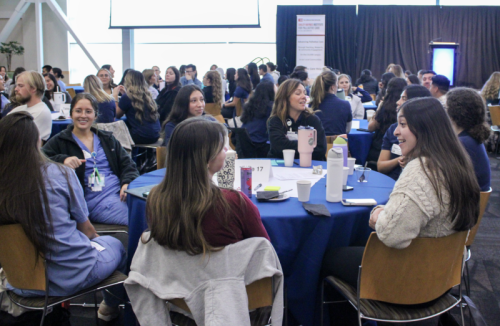
Load more...
Loading...


